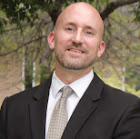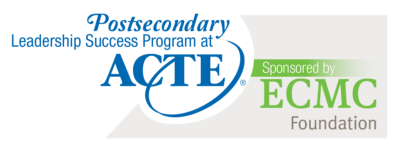 Meet C.J. Wurster, district director at Maricopa County Community College District. Wurster’s Techniques interview appears as part of a digital-exclusive spotlight series on fellows in the Postsecondary Leadership Success Program at ACTE – Sponsored by ECMC Foundation.
Meet C.J. Wurster, district director at Maricopa County Community College District. Wurster’s Techniques interview appears as part of a digital-exclusive spotlight series on fellows in the Postsecondary Leadership Success Program at ACTE – Sponsored by ECMC Foundation.
What leadership skills do you hope to develop as part of the Postsecondary Leadership Success Program at ACTE – Sponsored by ECMC Foundation?
One of the things I most appreciate about this program’s design is how it really allows participants to seek out opportunities for growth in areas they feel are most valuable to their career trajectory. After completing an initial inventory on my current skills and interests, I identified tools that would support me in becoming a more effective leader. This led to my focus on building leadership skills in three areas:
- Developing and articulating a shared vision
- Developing an increased understanding of access and equity issues in CTE, and identifying strategies for addressing gaps that exist
- Understanding strategies to support data-informed decision-making
Through personal research, regular check-ins with my mentor, and monthly connections with other fellows, I have learned to approach the development of these skills in a thoughtful and meaningful way.
In what ways have you innovated to engage students >amp; inspire colleagues in CTE through the COVID-19 pandemic?
Particularly helpful during the pandemic’s early days was my college’s commitment to effective communication. My team and I connected every morning to discuss updates and how to address any challenges we faced. This was critical to establishing the idea that we all faced this new uncertainty together. We also incorporated weekly virtual meetings with all of our CTE instructors — across multiple campuses — to discuss and share as we shifted to online and then eventually back to hybrid and in-person classes. These weekly meetings sometimes featured open discussions, or instructors facilitated conversations about best practices. to share.
The college’s beauty and wellness programs (cosmetology, aesthetics and massage therapy) were among the first to return to in-person instruction. To maintain social distancing, we adopted an innovative hybrid approach where half of each cohort began the day in person while the other half participated in a live online environment. Midway through the day, they would switch to the other learning modality. This allowed students to learn their hands-on skills, while also maintaining the safest environment possible.
The work that our CTE faculty and instructors have done with students in the face of a pandemic has been truly amazing and inspiring. Students have also shown tremendous resilience and grit as they remain committed to their educational pursuits.
The past 19 months have changed the community college student experience for years to come. And this brings up some important questions: What new expectations do students have of their college-going experience? And how do we ensure equitable access to CTE programs that may be delivered online, hybrid and/or in person?
Our education systems face many challenges in 2021. Please discuss the steps CTE can take to improve equitable access to high-quality CTE programs of study.
In many ways, CTE programs are incredibly well positioned to support the nation’s economic recovery. CTE programs can offer a short completion time and lead to immediate workforce entry. Further, enrollment in CTE can support upward mobility for individuals who may be unemployed or underemployed due to the pandemic. Career and technical education programs, delivered through flexible models, also may accommodate other demands on our students’ time, such as daycare needs or work schedules.
Educators have an opportunity to identify strategies that address basic student needs, such as food or housing insecurity, by connecting CTE students to college and community resources. These are not easy challenges to solve. But, as the value of CTE increases, we must also increase our focus on creating the optimal student experience to support equitable access.
Learn more about the Postsecondary Leadership Success Program at ACTE – Sponsored by ECMC Foundation.
Please also meet:
- Tiffanie Rosier, STEM education coordinator at Northern Virginia Community College
- Tachaka Hollins, assistant vice chancellor for academic affairs at the Tennessee Board of Regents
- Tracey D. Cooper, executive director of nursing at Temple College
- Bernie Phelps, director of Perkins, Perkins Rural Reserve and dual enrollment at Montana Technological University, Highlands College
- Vickie Thomas, director of the Center for Workforce and Community Development at Eastern New Mexico University – Roswell
- Moira Lafayette, dean of health sciences and public safety at Blackhawk Technical College
- Brad Kinsinger, director of the Global Agriculture Learning Center at Hawkeye Community College
- Eric Sewell, director of technical education at Southern Union State Community College
- Katie Vincent, director of workforce partnerships at Owensboro Community and Technical College
- Xue Xing, assistant professor of teaching and learning at University of Nevada, Las Vegas
- Aleksander Marthinussen, program manager with NOVA SySTEMic at Northern Virginia Community College
- Martha Payan-Hernandez, director of CTE at Fullerton College
- Dan Adams, former CTE administrator and current stay-at-home dad
- Ashlee Spannagel, dean of CTE and workforce development at Southeastern Community College
- Darlene O’Rourke, Perkins grant director and officer at Queensborough Community College
- Shelsi Barber-Carter, CTE coordinator at Baton Rouge Community College








